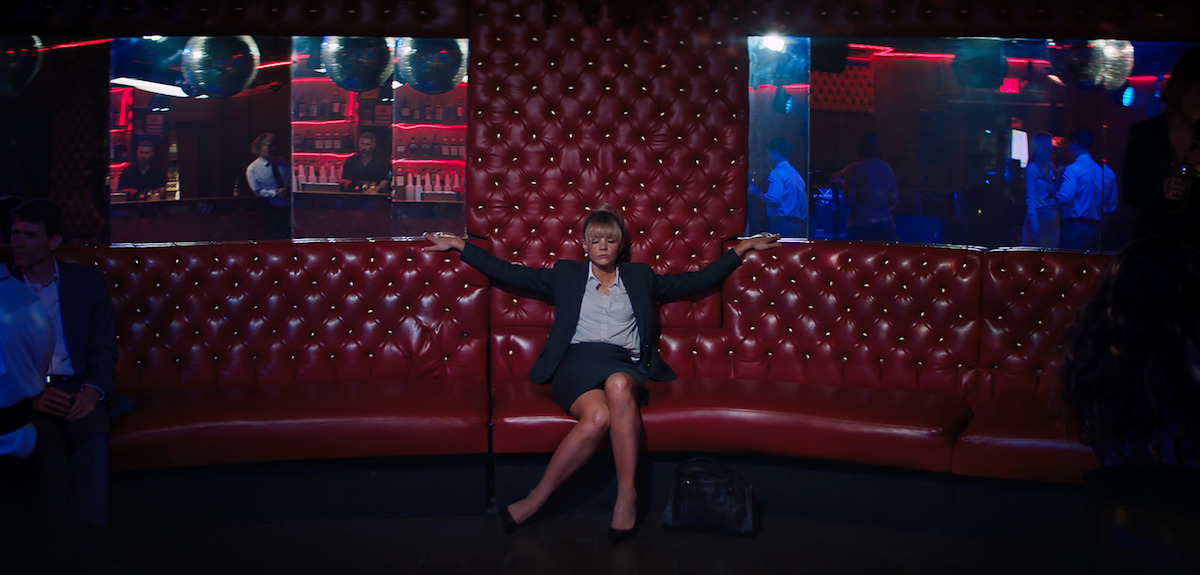Content warning: Promising Young Woman is a film that discusses and has depictions of sexual assault. While this usually would be a reason to avoid the content, I do highly recommend seeking this film out and if these aspects may trigger you, please consider taking a friend or support person to see it if it sounds like something you might be interested in.
Emerald Fennell’s profoundly acidic debut feature film, Promising Young Woman, has me concerned.
Carey Mulligan stars as Cassandra Thomas, someone who has been shaped into a keenly intelligent woman full of simmering rage by the permeating toxic masculinity in society that hangs in the air like an unwavering stench. On weekends, she attends clubs, draping herself across lounges in a drunken pose, hooking the attention of opportunistic men looking for a vulnerable woman to take advantage of. Playing up to their horrifying actions, Cassie feigns a drunken refusal, of which the men completely ignore and push past.
A simple ‘no’ is not enough, with each man thinking that it’s ‘just the alcohol talking’, and eager to sexually assault Cassie. It’s not until she delivers an outwardly sober rebuttal to their actions that they realise that they’ve been caught. Stripping them down with a verbal assault, the men are left ashamed, afraid, and accusatory, ideally left with a mindset of thinking twice about their actions next time round.
As a rampant tear-down of the patriarchy and a devastating essay about the #MeToo generation, it’s absolutely clear that Promising Young Woman is a masterful horror film for the ages. Promising Young Woman does to misogyny what Get Out did to racism: highlighted how endemic the issue is, pointing out that no matter how much of an ally, or how much of a ‘good guy’ a man thinks he is, he’s still part of a system that punishes women for simply existing.
Emerald Fennell’s script is darkly comedic, and furiously horrific, enrapturing the viewer as it disturbs and fascinates with gleeful mania via Carey Mulligan’s career-defining performance. As Cassie, Mulligan has never been better, and watching her meticulously tear down man after man, and the women who help cover up their lies, is the main giddy-like thrill of watching Promising Young Woman. Additionally, with a soundtrack that’s peppered with music from The Spice Girls and Paris Hilton helps Promising Young Woman subvert aspects the ‘chick flick’ genre to brilliant effect.
Mulligan is elevated by a supporting cast that excels across the board, with subdued turns from Jennifer Coolidge and Clancy Brown as her parents, to a heightened-reflection of himself with Bo Burnham as a possible-partner, who plays up his doe-eyed charm to a nauseating level. Alison Brie and Connie Britton both engage with mesmerising performances as privileged women in power who actively enable the abusive actions of the men around them. Laverne Cox is also solid as Cassie’s coffee store owning boss, although I do wish she was given more to do. The long catalogue of men who make up Cassie’s fodder to chew up are brilliant too, all delivering a frighteningly real portrayal of pathetic men afraid that their privilege is about to be taken away, with notably pitiful turns from Chris Lowell and Max Greenfield.
Yet, despite how pathetic and outwardly obnoxious those men are, I fear that many male viewers might actively dismiss the core text of the film, and as such, label themselves as ‘different’, or ‘not like that’. As Mulligan cements Cassie as an instant iconic antihero, she also inadvertently creates a poster figure that will likely have men celebrating her villainous actions for all the wrong reasons. Promising Young Woman could easily find itself situated alongside Fight Club as being a perpetually misunderstood film by a legion of male viewers.
Now, that’s not the films fault at all – the argument it puts forward is a devoutly excoriating one that burns all men to the ground, and rightly so – but rather, it just further highlights how much the men of the world need to improve, and actively self-reflect on their actions.
I don’t say this to also highlight that ‘I’m not like that’, because I damn well am like some of the men in the film. Christopher Mintz-Plasse’s blubbering film nerd is a nauseating reflection of me a few years ago, with his hazy apartment being adorned with Criterion posters, and his obnoxious bleating about how great Consider the Lobster is. The less said about his rambling ‘original idea’ that sounds awfully like Good Time, the better.
What I’m saying is that if you’re a male viewer and you don’t see yourself or the world of men that you find yourself within, then you need to look harder at this text. It literally hits you over the head time after time. It is not subtext, it is the text.
Through each gut-wrenching moment Fennell paints how men continuously rally themselves and each other out of a situation by blaming their actions on the woman, condemning them for an event that they should never have been subjected to. It’s then a masterful touch that Fennell decides to close the film on an extremely downbeat ending that immediately feels cruel and unnecessary, but in reality exists to force the audience to reconcile with the events that have just taken place. It would be dishonest to the text of the film to end any other way, especially in a manner that may feel like the film has done the audiences work for them.
Because, really, while Promising Young Woman astounds with its brilliance at each turn (albeit, after a beginning saddled with pacing issues), its core goal is to force the audience to realise that until there is systemic changes and we as a global society address the toxic masculinity that is so prevalent within our world, then we will continue to lose women to sexual assaults, endemic inequality, and rampant misogyny. If you identify as a man find yourself walking out of this film feeling that you’re off scot-free, then turn around and sit through this all over again.
And then once you’ve done that, maybe watch The Hunting Ground or Audrie & Daisy or The Assistant or countless other films that address the impact of sexual assaults on society as a whole, because dammit, we’ve still got a lot of work to do, and men: the change starts with us.
Director: Emerald Fennell
Cast: Carey Mulligan, Bo Burnham, Laverne Cox
Writer: Emerald Fennell



